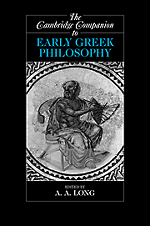Book contents
- Frontmatter
- 1 The scope of early Greek philosophy
- 2 Sources
- 3 The beginnings of cosmology
- 4 The Pythagorean tradition
- 5 Heraclitus
- 6 Parmenides and Melissus
- 7 Zeno
- 8 Empedocles and Anaxagoras
- 9 The atomists
- 10 Rational theology
- 11 Early interest in knowledge
- 12 Soul, sensation, and thought
- 13 Culpability, responsibility, cause
- 14 Rhetoric and relativism
- 15 Protagoras and Antiphon
- 16 The poetics of early Greek philosophy
- Bibliography
- Index
16 - The poetics of early Greek philosophy
Published online by Cambridge University Press: 28 May 2006
- Frontmatter
- 1 The scope of early Greek philosophy
- 2 Sources
- 3 The beginnings of cosmology
- 4 The Pythagorean tradition
- 5 Heraclitus
- 6 Parmenides and Melissus
- 7 Zeno
- 8 Empedocles and Anaxagoras
- 9 The atomists
- 10 Rational theology
- 11 Early interest in knowledge
- 12 Soul, sensation, and thought
- 13 Culpability, responsibility, cause
- 14 Rhetoric and relativism
- 15 Protagoras and Antiphon
- 16 The poetics of early Greek philosophy
- Bibliography
- Index
Summary
INTRODUCTION: THE POETICS OF EARLY GREEK PHILOSOPHY?
For some readers, the very title of this chapter will seem a paradox or a provocation. After all, while the term “Presocratics” is modern, the concept has ancient roots; and from the very beginning it has been used to distinguish philosophers who, for the most part, wrote in prose, from poets who composed in verse. Such a distinction, which establishes the largely nonphilosophical character of the early Greek poets and the largely nonpoetical character of the early Greek philosophers, may seem self-evident to us, but in fact it has not always been so. Heraclitus names Hesiod and Xenophanes, in the same breath with Pythagoras and Hecataeus (DK 22 B40); Hippias wrote a treatise paralleling the opinions of poets and philosophers (DK 86 B6); Plato does not distinguish sharply between poets and philosophers among his predecessors, and he has his Protagoras claim that ancient poets were really sophists but disguised their opinions for fear of exciting hostility [Prot. 316d-e). As far as we know, Aristotle was the first author to distinguish terminologically between what he called mythologoi and theologoi on the one hand and physikoi or physiologoi on the other. On his view, the former group were really storytellers, poets narrating myths about heroes and gods, and any views about the nature of the world that might be extracted from their works were incidental, obscure, and philosophically uninteresting; the latter group, beginning with Thales, were engaged in basically the same kind of investigation of the physical world as Aristotle himself was and, even though their theories were, unsurprisingly, deficient in comparison with his own, nonetheless they were philosophically serious, that is, they were worth studying, pillaging, and refuting.
- Type
- Chapter
- Information
- The Cambridge Companion to Early Greek Philosophy , pp. 332 - 362Publisher: Cambridge University PressPrint publication year: 1999
- 33
- Cited by



